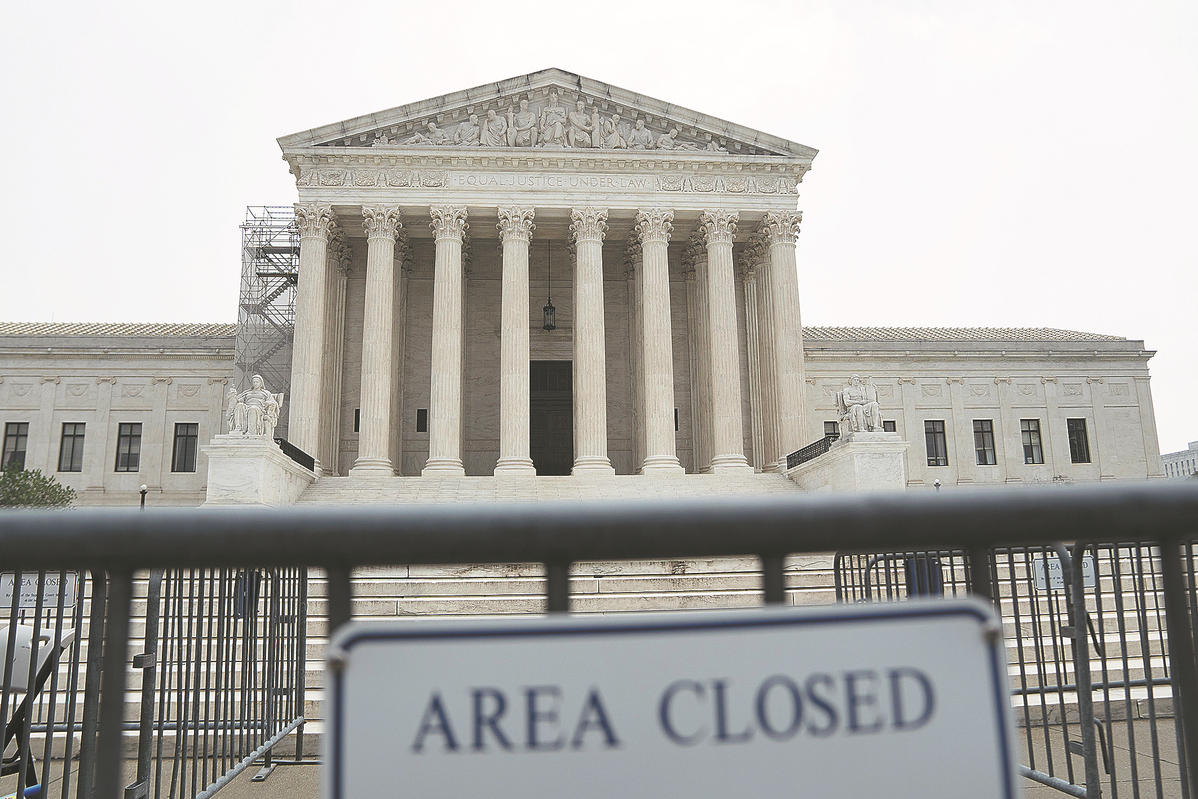Legacy admissions in the eye of storm
Practice of alleged discrimination, preferential treatment in elite schools probed
Editor's note: With the US Department of Education launching a civil rights probe into Harvard University's policies on "legacy admissions", this page takes a closer look at alleged racial discrimination in college admissions in the country, as well as the findings of a recent study showing affluent children being overrepresented in elite schools.
Following the US Supreme Court's ban on considering race in college admissions, the "legacy practice" of Harvard University and other elite schools in the United States have come under heightened scrutiny, triggering a fierce national debate on wealth, privilege and race.
As one of the nation's richest and most prestigious universities, Harvard has been the focus of criticism over its controversial admission policies, including consideration of applicants' race and their ties to the university.
The US Department of Education has started a civil rights probe into whether Harvard discriminates in its undergraduate admissions process by giving preferential treatment to children of wealthy donors and alumni — a practice called "legacy admissions".
The investigation is a response to a complaint filed by Lawyers for Civil Rights, a nonprofit in Boston, on behalf of three black and Latino community groups early last month.
They alleged the students who receive the preferential treatment are "overwhelmingly white" and make up as much as 15 percent of Harvard's admitted students. They called on the Education Department to investigate Harvard's use of donor and legacy preferences and "the resulting unjustified disparate impact".
The complaint was filed just days after the Supreme Court's decision on June 29 to strike down Affirmative Action in college admissions. The ruling bans schools from taking race into consideration as a specific basis for accepting a candidate.
The challenge against Harvard was brought by the conservative group Students for Fair Admissions in Virginia, which has been focusing on eliminating affirmative action in higher education and other sectors.
The Supreme Court's conservative majority effectively overturned precedent reaching back 45 years, which colleges and universities had relied on to achieve student diversity.
The ban on race-conscious admissions has renewed the criticism of the controversial practice of legacy admissions. The practice is accused of systematically disadvantaging applicants of color and contradicting the universities' stated commitment to campus diversity.
Lawyers for Civil Rights said they filed this civil rights complaint against Harvard to "level the playing field for applicants of color who overwhelmingly are not benefited by these preferences".
In the complaint, the minority advocacy group asked the Education Department to declare that Harvard end the practice if it is to continue to receive federal funds and argued that legacy admissions "are not justified by any educational necessity".
The Education Department's Office for Civil Rights will examine whether Harvard violates Title VI of the Civil Rights Act of 1964, a federal law that prohibits discrimination, exclusion from participation or denial of benefits "on the ground of race, color or national origin".
According to the complaint, which cited Harvard data, 70 percent of the university's donor-related and legacy applicants are white, and they are about six times more likely to be admitted. For the Class of 2019, about 28 percent of them were legacies with a parent or other relative who went to Harvard.
Legacy preference has deep roots in higher education, especially at private colleges. It has been more widely used at top-tier universities than at less selective schools.
A 2011 study published in the journal Economics of Education Review showed that at 30 highly selective colleges, primary legacies, or those applicants with one of their parents being alumni of the school, were more than three times as likely to gain admission as non-legacies.
The controversy over legacy admissions has smoldered for a long time. The practice has drawn intense criticism in recent years, and was put into the spotlight in 2020 following a nationwide cheating scandal which also eroded public trust in college admissions.
In that case, wealthy parents paid an independent college counselor to arrange for cheating on their children's standardized tests or fake their athletic credentials and bribe coaches to secure admission.
Transparency undermined
Following the cheating scandal, more schools revisited the issue. Legacy admissions were criticized for compromising the principle of transparency and being directly at odds with the objective of advancing social mobility.
A growing number of prestigious schools have dropped legacy admissions, including Massachusetts Institute of Technology, Amherst College in Massachusetts, Carnegie Mellon University in Pennsylvania and Johns Hopkins University in Maryland.
Purdue University in Indiana and Indiana University said they have not considered alumni relationships in admissions.
Two most recent cases are Wesleyan University in Connecticut and the University of Minnesota Twin Cities. Both schools announced they would no longer consider applicants' ties to alumni in admissions decisions following the Supreme Court's ruling on Affirmative Action.
The practice was a distraction and "a sign of unfairness to the outside world", Wesleyan University President Michael Roth said.
The University of Minnesota Twin Cities will also stop favoring applicants who are the children of faculty members.
The Education Department's decision to investigate Harvard's admission policies was welcomed by minority advocacy groups. They said the legacy preference disproportionally benefited white and wealthy students who were less qualified and called the practice "an unfair and unearned advantage" for them.
"Legacy and donor admissions have long served to perpetuate an inherently racist college admissions process," Derrick Johnson, president and CEO of the National Association for the Advancement of Colored People, said in a statement.
"Every talented and qualified student deserves an opportunity to attend the college of their choice. Affirmative Action existed to support that notion. Legacy admissions exist to undermine it."
Critics of legacy admissions said the Supreme Court's Affirmative Action decision underscores the need to end those preferences as well.
The complaint filed by Lawyers for Civil Rights quoted the Supreme Court's majority opinion on affirmative action: "College admissions are zero-sum, and a benefit provided to some applicants but not to others necessarily advantages the former at the expense of the latter."
Harvard and other universities have defended legacy admissions as necessary to strengthen the connections between alumni and the schools and encourage them to make donations. Overall legacy applicants were highly qualified, Harvard said.
In 2019, US colleges and universities raised more than $11 billion from alumni, almost one-fourth of their total fundraising, according to the Council for Advancement and Support of Education.
At Princeton University in New Jersey, 10 percent of the Class of 2025 are children of alumni, and 73 percent of legacy students in the Class of 2023 are white, according to university data.
Princeton has defended legacy admissions, saying giving preference to the children of alumni helps build a sense of loyalty and belonging and spur alumni to give back to the university.

The US Supreme Court in Washington on June 29. LIU JIE/XINHUA
Defense slammed
Shamus Khan, a professor of sociology and American studies at Princeton, defended the legacy preference in a recent opinion article published by The New York Times.
He said poor students and students of color enjoyed "a big economic boost from going to elite schools" compared with legacy students. "And that's because elite colleges connected them to students born into privilege."
Khan's opinion sparked immediate opposition.
John Bowman, a professor of political science at Queens College of the City University of New York, wrote in a letter to the Times that upward social mobility was achieved not by "giving a leg up to the sons and daughters of the elite, but by providing our students with the skills necessary for success".
A poll by the Pew Research Center in Washington last year found that 75 percent of the people surveyed believed that legacy preferences should not be a factor in college admissions.
A new survey from Generation Lab, a research company in Washington, found 75 percent of college students and recent graduates believed it is unfair for colleges to consider legacy status in admissions.
US President Joe Biden also weighed in on legacy admissions in the wake of the Supreme Court's ruling on Affirmative Action, saying legacy admissions "hold back our ability to build diverse student bodies".
In 2021, Colorado became the first state to eliminate legacy admissions at all public colleges and universities when Democratic Governor Jared Polis signed a ban on the practice into law.
In Massachusetts, two Democratic legislators proposed a bill earlier this year seeking to tax rich colleges that favor families of alumni and donors in admissions policies and give the money to poorer community colleges.
The legislation targets Harvard, Williams College and some other schools that use legacy preferences when considering applications. It uses a formula determined by endowment value per student to determine fees based on a sliding scale.
Harvard, the richest US college with a $50.1 billion endowment, would be assessed at an estimated $103 million a year, according to the bill's sponsors.
Photos
Related Stories
- PayPal announces new CEO
- Opinion: Washington's forcible-feeble "de-risking" delusion
- Hawaii governor warns 10 to 20 more wildfire victims could be found per day after 96 deaths
- S. Korean activists urge calling off military exercises with U.S.
- Syria condemns U.S. forces for bus attack in Deir al-Zour
- 5 killed in U.S. house explosion
- U.S. attorney general appoints special counsel in Hunter Biden probe
- US investment ban hurts business interests, arouses concerns
- Commentary: Who is posing a dire threat to the global economy?
- Maui Island burnt in U.S. deadliest wildfire in over 100 years, more deaths predicted
Copyright © 2023 People's Daily Online. All Rights Reserved.









